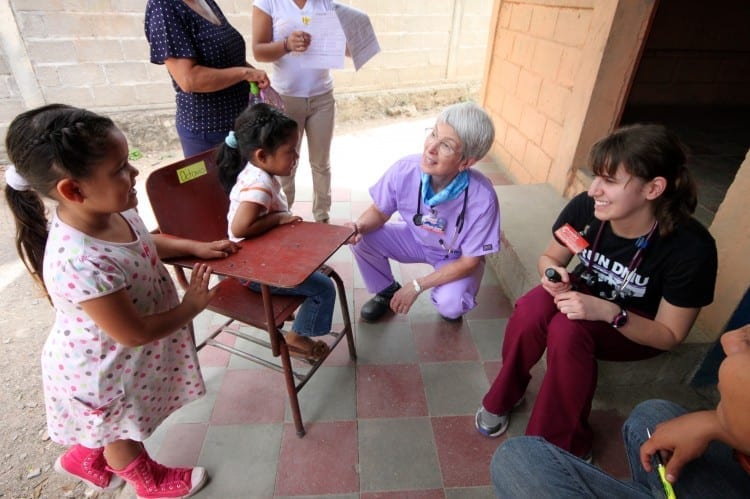
Our trip was in conjunction with Global Brigades, an organization with ongoing sites in multiple areas around the world. The Honduran staff for Global Brigades were quite good and prepared for our arrival. They provided translators, although some of our group were fluent in Spanish. Our students were overall very good, prepared, committed and fun. They worked very hard and scarcely had a complaint when things got rugged.
My assignment as the only obstetrician/gynecologist was to do women’s health, while other physicians saw children and men. It is not easy to transition one’s brain to a setting where there is no lab, no Doppler or sonography, no mammogram access, and yet patients were so grateful for what we sometimes thought was so little. The patients who had major health issues have few or no options, due to no money and no transportation. Most had walked two to four hours on dirt roads to the makeshift clinic and then waited all day in line to see us.
Perhaps the most difficult day for me was the day that I was unable to see all of the women who were waiting in line to see me and my students. I had wanted to stay until every woman who was waiting could be seen, but the Global Brigades leader required us to be on the bus to return to our compound at a certain time. That meant I had to write “rescheduling” slips to 10 women to return to see me the following day. What an unthinkable thing to do to women who had waited in line all day and walked to see me! The next morning all 10 of the women were there waiting in line again, with not a single one complaining. I was so humbled by that experience!
Our little group of practitioners usually talked in the evenings about the missing pieces in Honduras for providing basic care, knowing full well that we have not yet implemented perfect arrangements in the United States for caring for everyone. Our ideas focused on the very most basic issues of education and making preventive care available. We saw firsthand some of the costs of not providing preventive health and dental care, in terms of human suffering of varying degrees.
How easy it is to take many things for granted here at home! Personal safety was one example. In Honduras we constantly were accompanied by soldiers/police with big guns. I never felt threatened, but we were always reminded to not wander off from our group or to get off the bus in transit to the clinic sites.
Another part of my life that I rarely think about in my work in Des Moines is the availability of clean equipment. I was so grateful for the donated equipment we used to provide safe care to the patients in Honduras.
I was amazed at how utterly easy and refreshing it was to put aside electronic medical records and just take care of the patient. (However, the students did spend hours at the end of the day entering data from patient encounters for the Global Brigades records.) Also, it was lovely to not hand the patient a bill as she is leaving—a chance to focus on medicine as a service and not a business.
At times the students expressed puzzlement that they were not seeing as much pathology as they expected, and that we really hadn’t “done much” that day. However, we had seen 30 women in a usual day, many of whom gave us hearty hugs and expressions of blessings. I reminded the students of something I have grown to understand over the years of providing patient care: One cannot put a price on reassurance, particularly in the setting of minimal care options and resources. We came to their village, listened to them, touched them, sometimes gave medications, but mostly gave information, encouragement and reassurance.
I am quite confident that an opportunity such as the Honduras trip is professionally a “centering” experience that allows one to be reminded that the practice of medicine is truly a privilege of service.
Rebecca Shaw, M.D., FACOG, is an assistant professor of obstetrics and gynecology at DMU and a physician in Des Moines. She was one of nine health care providers who participated in the University’s Honduran health service trip.

